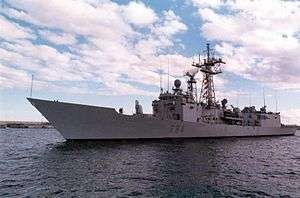Spanish frigate Reina Sofía
 | |
| History | |
|---|---|
| Name: | Reina Sofía |
| Namesake: | Queen Sofía of Spain |
| Builder: | Bazan |
| Laid down: | 12 October 1987 |
| Launched: | 19 July 1989 |
| Commissioned: | 30 October 1990 |
| Homeport: | Naval Station Rota |
| Status: | in active service |
| General characteristics | |
| Class and type: | Santa Maria-class frigate |
| Displacement: |
|
| Length: | 138.8 m (455 ft 5 in) |
| Beam: | 14.3 m (46 ft 11 in) |
| Draft: | 8.6 m (28 ft 3 in) |
| Propulsion: | 2 × General Electric LM2500-30 gas turbines generating 41,000 shp (31 MW) coupled to a single shaft and controllable-pitch propeller |
| Speed: | 30 knots (56 km/h; 35 mph)+ |
| Armament: |
|
| Aircraft carried: | SH-60 Seahawk LAMPS III helicopter |
Reina Sofía (F-84) is the fourth of six Spanish-built Santa Maria-class frigates, based on the American Oliver Hazard Perry-class design, of the Spanish Navy.
Laid down on 12 October 1987, and launched on 19 July 1989, Reina Sofía was commissioned in service on 30 October 1990. She is named for Queen Sofía of Spain.
All of these Spanish frigates have the length of the later Oliver Hazard Perry frigates, and have a wider beam than the US Navy design, and therefore able to carry more top weight. Fin stabilizers are fitted.
Other units of class
This article is issued from
Wikipedia.
The text is licensed under Creative Commons - Attribution - Sharealike.
Additional terms may apply for the media files.